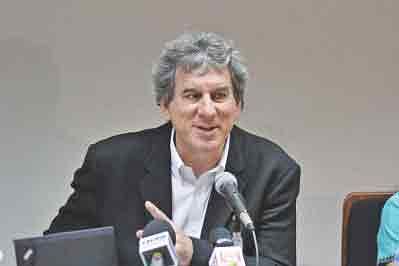Stop mass trial of BDR mutiny

Brad Adams
The mass trial for the February 2009 BDR mutiny is fundamentally flawed and the accused are subjected to gross human rights violations, claimed a report by Human Rights Watch (HRW).
Releasing the report at a press conference at Brac Centre in the capital's Mohakhali yesterday, HRW officials called upon the government to immediately halt the trial and disband Rapid Action Battalion (Rab).
They also demanded the government form a special independent commission to investigate the custodial deaths and torture of BDR (now BGB) soldiers and take action against human rights violations by the members of Directorate General of Forces Intelligence (DGFI) and other intelligence agencies.
Many of over 6,000 detained suspects in the BDR mutiny cases even do not know what they have been accused of doing, said the officials.
Hundreds of the accused are being tried simultaneously with very little scope to have access to defence lawyers, said Brad Adams, executive director of HRW in Asia.
He found it against the basic principles and international standards of fair trial.
Those responsible for the BDR massacre and killing of 74 people including 57 army officers must be tried and convicted, he noted, but the suspects must have rights to fair trial and should not be subjected to human rights violations perpetrated by the security forces.
At least 47 detained members of erstwhile Bangladesh Rifles (BDR) died in custody. Some of them might have died of natural causes and the others succumbed to custodial torture, said Brad.
But the government, he maintained, is afraid of challenging the custodial deaths and human rights abuses by the security forces during the first nine months after the mutiny and by the army during the trial process.
The army wanted to apply military force with heavy weapons to quell the mutiny, but the two-month old Awami League government of Prime Minister Sheikh Hasina did not approve it fearing massive casualties.
It triggered extreme anger in the senior ranks of the army. The difference between government's decision and army's desire had an adverse impact on the relationship between the two and the tensions continue to prevail, mentioned Brad. “Consequently, it caused serious human rights violations against the suspected mutineers.”
Those detained within nine months of the mutiny suffered tremendous abuse and torture of worst kind at unofficial detention centres like the DGFI and Rab headquarters, said Tejshree Thapa, south Asian researcher of the New York based HRW. She conducted the research and wrote the report on human rights violations against the suspects in custody.
“The accused were beaten up hanging upside down, suffered electric shocks in ear and private parts and their nails were pulled off during interrogation… Most of the time, members of army, DGFI, Rab, NSI and military intelligence agencies interrogated the accused,” she noted.
The findings of the HRW, said Tejshree, are based on interviews with the family members of the victims, legal counsels, post-mortem reports, medical documents and photographs.
The HRW has obtained two investigation reports on the mutiny -- one prepared by the government and the other by the army. The reports significantly differ on why the mutiny occurred.
The government-commissioned report cited gross failure of the military and civil intelligence agencies for the carnage, while the army in its report faulted the government for not taking a hard line against the BDR before the mutiny.
Replying to a question, Brad said on Tuesday they saw the home minister, who denied any human rights abuse in this regard.
They also contacted the authorities of Rab and Border Guards Bangladesh (BGB), but they (authorities) refused to meet the rights body and give any information.
They however did not communicate with the army or DGFI.
Md Nur Khan, executive member of local human rights watchdog Ain o Salish Kendra, was present at the press conference. It assisted the HRW in preparing the report.

 For all latest news, follow The Daily Star's Google News channel.
For all latest news, follow The Daily Star's Google News channel. 



Comments